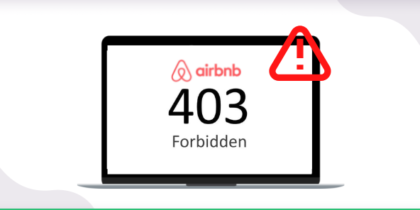Table of Contents
Imagine receiving an SMS from UPS telling you an urgent package is waiting for delivery. You are filled with excitement and curiosity and click the provided link. This seemingly harmless action puts you directly in the hands of scammers without you even realizing it.
This link redirects to a fraudulent website that looks identical to the official UPS website. When you’re asked for personal information, such as credit card information, you unknowingly give sensitive information to the bad guys. After a while, you realize you are a victim of the UPS text scam.
Source: Money
Scams like these have recently gained traction. These deceptive messages, masquerading as legitimate communications from UPS, aim to trick unsuspecting individuals into sharing sensitive information or falling victim to financial fraud.
In this article, we will explore the intricacies of UPS text scams, shed light on common red flags to watch out for, and provide essential tips to safeguard yourself against these deceitful schemes.
What is a UPS text scam?
UPS text scam is a sneaky scheme where scammers impersonate the delivery service, UPS, in text messages. They’re masters of deception, trying to trick unsuspecting people into giving away their info or getting caught up in financial scams. It’s a dirty trick that plays on our trust in a well-known brand like UPS. That’s why it’s important to stay informed and be on guard against these crafty scammers.
How does it work?
Scammers initiate UPS text fraud by sending text messages that appear to come from UPS. These messages typically contain urgent or attractive content, such as missing packages or special delivery offers. The goal is to get attention and response.
When you encounter a UPS text scam and click on the provided link, you expose yourself to various risks. Here are three possible outcomes:
- Falling into a phishing trap
The link may lead you to a fraudulent UPS website cleverly designed to deceive you into sharing sensitive information. The scammers will request details like your name, phone number, address, and sometimes your Social Security number (SSN) and credit card numbers. Sadly, all the information you provide will end up in the hands of the scammer.
Source: Getty Images
- Demanding payment for your package
Scammers might claim that a fee must be paid to release your shipment. They could deceive you into thinking that a customs fee or another payment is required before your package can be delivered. They may ask for your credit card information or insist on payment through gift cards, wire transfers, or cryptocurrency.
- Malware installation:
Clicking on the link could install malicious software (malware) on your mobile device. This malicious software can wreak havoc by scanning your device for valuable information like bank accounts or credit card numbers. It might also spy on your activities or encrypt your device, holding it hostage until you pay a ransom (known as ransomware).
Most common UPS text scams
Let’s explore the five most common examples of UPS text scams:
Fake UPS package delivery notifications
Scammers send text messages pretending to be UPS, notifying you about a package delivery. They aim to exploit your curiosity and eagerness to receive a package. However, clicking on links or providing personal information can lead to potential fraud or compromise of your data.
Source: UPS
Texts claiming you owe a delivery fee
These scams involve receiving a text message stating that you owe a fee for a UPS delivery. The scammers may threaten consequences if you don’t pay immediately. Legitimate fees are usually handled through official UPS channels, not unsolicited text messages.
Source: UPS
Fake customer service scams
Scammers create fraudulent customer service lines, claiming to be from UPS, and provide fake contact information on their websites or through unsolicited emails or text messages. They aim to gather personal information or trick individuals into making payments for supposed shipping issues.
Source: UPS
UPS texts that send you to phishing sites
Scammers create convincing replicas of UPS websites and include links in their text messages. They deceive you into believing you must verify information or track your package. However, these links lead to phishing sites where scammers attempt to collect your details for malicious purposes.
Source: UPS
Scam texts that infect your device with malware
Some UPS text scams involve links that, once clicked, install malware on your device. This malware can compromise your device’s security and privacy, potentially leading to data theft, spying, or even holding your device hostage for ransom.
Source: UPS
Watch out for these red flags!
No expected delivery
If you receive a text about a UPS delivery, but you’re not expecting any packages, it’s likely a scam. Scammers often target you when they think you’re anticipating a delivery.
Spelling and grammar errors
Watch for poorly spelled words, grammar mistakes, or awkward phrases in the text. Scammers often make these errors, like words written together or extra spaces, which can give away their fraudulent intentions.
Unsolicited messages with links
UPS typically sends text messages only if you request SMS updates for scheduled delivery. If you didn’t ask for updates, be cautious of clicking on any links in unsolicited messages. It’s better to be safe than sorry.
Source: Verified.org
Sense of urgency
Beware of scammers creating a sense of urgency. They may claim you’ll miss your delivery or owe money if you don’t act immediately. Remember, pressuring tactics like these are common in phishing attempts.
Source: TheDailyJeff
Requests for payment
UPS may require legitimate customs or duty fees for certain orders, but they will never ask for payment or financial information outside their official website, “UPS.com.” If a text asks for payment in gift cards or cryptocurrency, it’s a major red flag indicating scammers at work.
Source: Verified.org
Fake tracking numbers
Always verify the tracking number provided in a text message by checking it on the official UPS tracking page, “UPS.com/track.” If the tracking number doesn’t work there, it’s likely a scam.
Source: UPS
Suspicious links
Be cautious of links that don’t lead to https://www.ups.com/. Scammers often use deceptive URLs that may include the word “ups” but aren’t simple UPS websites. Double-check before clicking on any links.
Strange phone numbers
In the United States, legitimate UPS text communications should come from “MYUPS” (69877). If you’re in a different country, check for the official UPS SMS number specific to your location to ensure authenticity.
Source: Mix95.7
Scammed! What to do next?
If you have fallen victim to a UPS text scam, here are the steps you should take:
Cease any further communication.
Immediately stop interacting with the scammers. Do not respond to their messages or provide them with any additional personal information.
Report the scam
Contact your local law enforcement agency and report the scam. You can report the incident here or to the FTC. Provide them with all relevant details, including text messages, phone numbers, and any other information you have about the scammers.
Notify UPS
Reach out to UPS directly and inform them about the scam. Contact customer service at 800-742-5877 or find your country’s number here. Provide them with the details of the fraudulent messages you received. You can share some screenshots of the scam on fraud@ups.com as proof. This will help UPS track the scam and take appropriate action.
Monitor your accounts
Monitor your bank accounts, credit cards, and other financial accounts for unauthorized transactions. If you notice any suspicious activity, report it immediately to your financial institution and follow their instructions for resolution.
Update your security
Change passwords for your online accounts, especially if you used the same credentials for multiple platforms. Consider enabling two-factor authentication for added security.
Educate yourself
Learn from the experience and educate yourself about common scams and how to identify them. Stay informed about the latest tactics scammers use to protect yourself and others.
Why are scammers targeting you?
Wondering why you’ve been receiving scam messages? Well, the straightforward answer is that someone ended up with your phone number who shouldn’t have.
But you might be thinking, how did this happen? Here’s the deal:
Everything you do online, whether posting on social media or signing up for another email newsletter, leaves behind a digital trail. And unfortunately, it looks like your personal information might have found its way into the hands of hackers through the websites you browse.
So, as we speak, there’s a chance that your details are floating around in those less-than-reputable corners of the internet.
Get a shield against online scams!
Worried about falling victim to UPS text scams? Safeguard your online activities with PureSquares’ cutting-edge security solutions. Our comprehensive suite of protective tools, including PureVPN, PureKeep, PureEncrypt, and PurePrivacy, forms the ultimate defense dream team.
PureVPN
Unleash your browsing prowess on the UPS website without compromising your identity. With state-of-the-art features, PureVPN keeps you anonymous while you scout the finest deals and explore UPS services. Enjoy a worry-free shopping experience while keeping your privacy intact.
PureKeep
Bid farewell to the hassle of managing numerous passwords. PureKeep is your personal password superhero, securely storing all your passwords in one place. Generate robust passwords on the fly and access them effortlessly across all your devices, ensuring maximum security for your UPS and other online accounts.
PureEncrypt
Entrust your valuable data to the impenetrable fortress of PureEncrypt. Benefit from bank-grade security and the convenience of cloud storage. Rest easy knowing your files are protected from data breaches, and enjoy seamless access whenever and wherever you need them.
PurePrivacy
Take control of your online presence and protect your sensitive information with PurePrivacy. Identify and mitigate data vulnerabilities, evade intrusive targeted ads, and maintain digital anonymity. With PurePrivacy, you’re in charge of your digital realm, shielding yourself from UPS text scams and other cyber threats.
Wrapping up
In summary, vigilance and awareness are key to protecting yourself from UPS SMS scams. Watch out for red flags such as unsolicited messages, suspicious links, and requests for payment or personal information. By carefully checking all communications directly with UPS, you can help protect your personal information and avoid becoming a victim of such fraud.
Stay vigilant, stay safe, and protect your online interactions with UPS and other shipping services from fraud.
Frequently Asked Questions
Yes, UPS does send text messages to customers. Still, it’s important to note that they typically send text messages only if you have a delivery scheduled with them and have specifically requested SMS updates.
UPS generally does not ask for money via text messages. If you receive a text message from UPS requesting payment or asking for financial information, it is likely a scam. UPS typically handles payment transactions through its official website or in person upon delivery.
The format of a UPS tracking number can vary depending on the service used, but it generally follows one of the following patterns:
1Z9999W99999999999: This is the most common tracking number format used by UPS. It starts with the letter “1Z,” followed by 16 digits.
T9999999999: This format is used for UPS Mail Innovations shipments. It begins with the letter “T” followed by nine digits.
999999999: Some UPS tracking numbers may consist of nine digits only, especially for international shipments.
UPS provides proof of delivery through various methods:
Delivery Confirmation: Includes date, time, and recipient’s name (if applicable), accessible through the UPS tracking system.
Signature Required: UPS collects a signature from the recipient as proof of successful delivery.
Electronic Proof of Delivery (ePOD): Allows recipients to view delivery details online, including name, date, time, and signature (if applicable).
UPS My Choice: Offers recipients control over deliveries with alerts, authorization options, package redirection, and rescheduling for added convenience and successful delivery.
Yes, apart from UPS text scams, there are other scams that fraudsters may attempt using the UPS name. These can include email scams, fake websites, phone scams, and even in-person scams. It’s important to stay vigilant and be cautious of any suspicious communication or requests for personal information or payment that claim to be from UPS.



